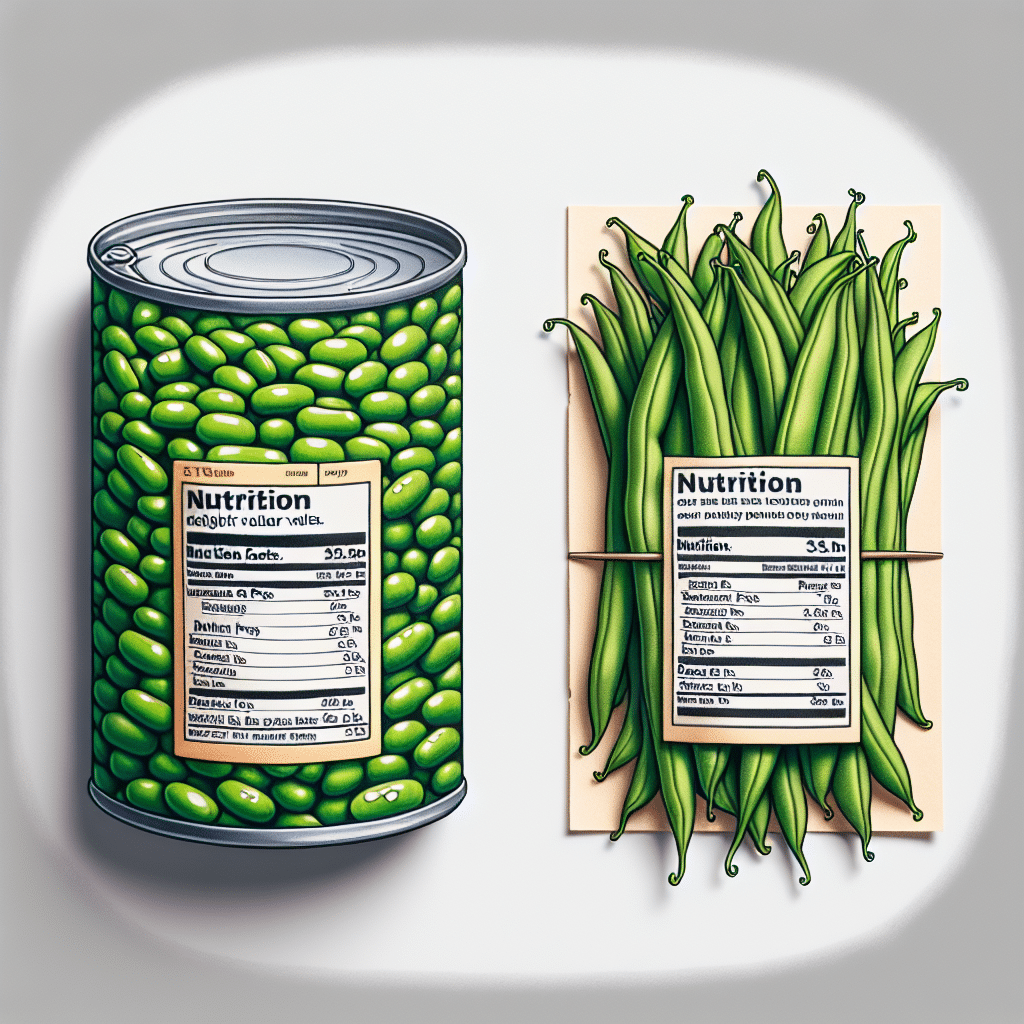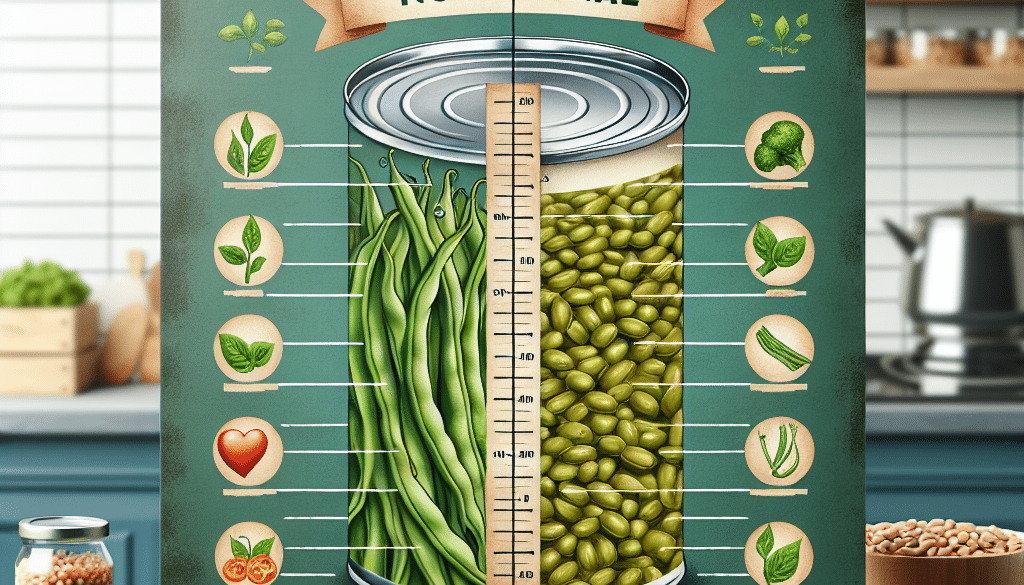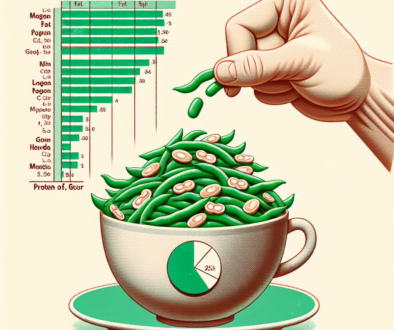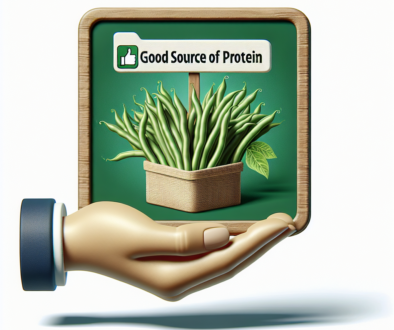Are Canned Green Beans As Nutritious As Fresh?
-
Table of Contents
- Are Canned Green Beans As Nutritious As Fresh? A Comprehensive Analysis
- Nutritional Breakdown of Green Beans
- Fresh Green Beans: The Gold Standard?
- Canned Green Beans: Convenience vs. Nutritional Content
- Comparative Studies and Research Findings
- Practical Considerations
- Enhancing the Nutritional Value of Canned Green Beans
- Conclusion: Balancing Nutrition and Practicality
- ETprotein: Enhance Your Diet with High-Quality Protein Products
Are Canned Green Beans As Nutritious As Fresh? A Comprehensive Analysis

When it comes to consuming vegetables, the debate between fresh and canned options is a common one. Green beans, a popular and nutritious vegetable, often come under scrutiny in this discussion. This article aims to dissect the nutritional value of canned green beans in comparison to their fresh counterparts, providing insights into which might be the better choice for your health.
Nutritional Breakdown of Green Beans
Before delving into the differences between canned and fresh green beans, it’s important to understand their nutritional content. Green beans are a low-calorie vegetable that is rich in vitamins, such as Vitamin C, Vitamin K, and the B vitamins. They also contain essential minerals like iron, calcium, and magnesium, and are a good source of dietary fiber and antioxidants.
Fresh Green Beans: The Gold Standard?
Fresh green beans are often considered the gold standard for nutrition. They are typically harvested at their peak and, when consumed shortly after picking, retain most of their vitamins and minerals. However, the nutrient content of fresh green beans can degrade over time. Factors such as exposure to light, heat, and air, as well as the time elapsed since harvesting, can diminish their nutritional value.
Canned Green Beans: Convenience vs. Nutritional Content
Canned green beans are praised for their convenience and longer shelf life. The canning process involves blanching the beans in hot water to kill bacteria and sealing them in an airtight container. This process can affect the nutritional content of the green beans in several ways:
- Vitamin C, being heat-sensitive, can be partially lost during the blanching process.
- Some B vitamins may also be reduced due to the high temperatures involved.
- Minerals and fiber are largely retained, as they are more stable during the canning process.
- Canned green beans may contain added salt, which can be a concern for those monitoring their sodium intake.
Despite these changes, canned green beans still provide a substantial amount of nutrients and can be part of a healthy diet.
Comparative Studies and Research Findings
Several studies have compared the nutrient content of canned and fresh vegetables. A study published in the Journal of the Science of Food and Agriculture found that the differences in nutritional content between canned and fresh vegetables are not as significant as one might assume. In some cases, canned vegetables retained more nutrients than their fresh counterparts, especially if the fresh vegetables were stored for several days before consumption.
Another study by the University of Illinois concluded that canned green beans offer similar amounts of dietary fiber as fresh green beans, which is an important factor for digestive health.
Practical Considerations
When deciding between canned and fresh green beans, practical considerations also play a role:
- Seasonality: Fresh green beans may not be available year-round, or they may be more expensive during off-seasons.
- Convenience: Canned green beans are easy to store and prepare, making them a quick addition to meals.
- Shelf Life: Canned green beans have a much longer shelf life than fresh, reducing food waste.
- Cost: Canned green beans are often more affordable than fresh, especially when considering potential spoilage.
Enhancing the Nutritional Value of Canned Green Beans
If you opt for canned green beans, there are ways to enhance their nutritional value:
- Choose low-sodium or no-salt-added options to control your sodium intake.
- Rinse the beans before use to remove any excess salt or preservatives.
- Include canned green beans in a balanced diet with a variety of other vegetables and nutrient-rich foods.
Conclusion: Balancing Nutrition and Practicality
In conclusion, while fresh green beans may have a slight edge in terms of nutrient retention immediately after harvest, canned green beans are a nutritious alternative that can be more convenient and cost-effective. The differences in nutritional content are not as drastic as one might think, and both forms can be part of a healthy diet. Ultimately, the choice between canned and fresh green beans should be based on personal preference, availability, and lifestyle needs.
ETprotein: Enhance Your Diet with High-Quality Protein Products
For those looking to supplement their diet with additional protein, ETprotein offers a range of organic bulk vegan proteins that can complement the nutritional benefits of green beans. Whether you’re looking to boost your protein intake for fitness goals or seeking a plant-based protein source, ETprotein’s products are an excellent choice.
Their offerings include Organic rice protein, clear rice protein, pea protein, and more, all characterized by a neutral taste and non-GMO, allergen-free attributes. With L-(+)-Ergothioneine purity over 98%, ETprotein caters to a diverse range of industries and dietary needs.
For more information or to sample their products, please contact ETprotein and email sales(at)ETprotein.com today.
About ETprotein:
ETprotein, a reputable protein and L-(+)-Ergothioneine (EGT) Chinese factory manufacturer and supplier, is renowned for producing, stocking, exporting, and delivering the highest quality organic bulk vegan proteins and L-(+)-Ergothioneine. They include Organic rice protein, clear rice protein, pea protein, clear pea protein, watermelon seed protein, pumpkin seed protein, sunflower seed protein, mung bean protein, peanut protein, and L-(+)-Ergothioneine EGT Pharmaceutical grade, L-(+)-Ergothioneine EGT food grade, L-(+)-Ergothioneine EGT cosmetic grade, L-(+)-Ergothioneine EGT reference grade and L-(+)-Ergothioneine EGT standard. Their offerings, characterized by a neutral taste, non-GMO, allergen-free attributes, with L-(+)-Ergothioneine purity over 98%, 99%, cater to a diverse range of industries. They serve nutraceutical, pharmaceutical, cosmeceutical, veterinary, as well as food and beverage finished product distributors, traders, and manufacturers across Europe, USA, Canada, Australia, Thailand, Japan, Korea, Brazil, and Chile, among others.
ETprotein specialization includes exporting and delivering tailor-made protein powder and finished nutritional supplements. Their extensive product range covers sectors like Food and Beverage, Sports Nutrition, Weight Management, Dietary Supplements, Health and Wellness Products, and Infant Formula, ensuring comprehensive solutions to meet all your protein needs.
As a trusted company by leading global food and beverage brands and Fortune 500 companies, ETprotein reinforces China’s reputation in the global arena. For more information or to sample their products, please contact them and email sales(at)ETprotein.com today.














